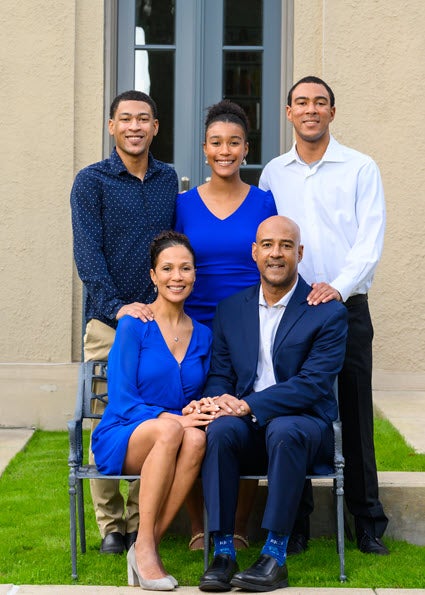On July 1, 2022, Reginald DesRoches assumed the role of president of William Marsh Rice University. Announcing DesRoches’s selection as president on November 11, 2021, Robert T. Ladd Jr., chair of the board of trustees, explained, “We embarked on a search for a proven leader who will be transformational, who will lead Rice to even greater stature and national recognition. We have found a leader who is inspirational and universally respected, a leader who is visionary, strategic, and kind.”
For the first time, the university welcomed a new president from within its own ranks. Presidential transitions and inauguration ceremonies are not only new beginnings but also celebrations of institutional continuity. In this instance of an internal candidate rising to the presidency, Rice embraced continuity forthrightly by choosing the serving Howard Hughes Provost as the new president, the eighth man to hold the office. As the search unfolded in the months preceding the announcement of President DesRoches’s selection, the university was enmeshed in the COVID-19 pandemic and was wrestling with its own past through its Task Force on Slavery, Segregation, and Racial Injustice. Impressed by Provost DesRoches’s leadership on these and other challenges, the search committee elevated this familiar and proven campus leader to a new role.

President DesRoches has been widely celebrated, of course, as the first African American to be named, first, provost and then president of Rice. But he also is the university’s first immigrant president. He was born April 20, 1967, in Port-au-Prince, Haiti, and came to New York City as a one-year-old with his parents. Along with his successful siblings, President DesRoches is a first-generation college graduate. After his upbringing in a working-class family in Queens, he pursued the study of engineering at the University of California, Berkeley, where he earned his bachelor’s degree in mechanical engineering (1990). After a short stint in industry following undergraduate study, he returned to Berkeley for a master’s degree in civil engineering (1993) and his doctorate in structural engineering (1998). His time in California, which included experiencing the destructive 1989 Loma Prieta earthquake, led to his careerlong study of earthquake resilience, a field in which he is internationally known. In 2002, he was honored with the prestigious Presidential Early Career Award for Scientists and Engineers. His curriculum vita records some 300 articles, along with presentations in more than thirty countries. He chairs the National Institute of Standards and Technology’s National Construction Safety Team within the U.S. Department of Commerce.
Before Rice, President DesRoches spent his academic career at the Georgia Institute of Technology, rising through the faculty ranks from 1998 to 2017 as an active scholar, teacher, mentor, and administrator. In 2010, he led a large team of engineers and others to his native Haiti to assess conditions after a major earthquake there. While serving Georgia Tech as the Karen and John Huff School Chair and Professor of Civil and Environmental Engineering, he was chosen as the William and Stephanie Sick Dean of the George R. Brown School of Engineering at Rice. For exactly three years, he oversaw the nine departments making up this highly ranked school, and on July 1, 2020, he was named the Howard R. Hughes Provost of Rice. David W. Leebron, President DesRoches’s predecessor, celebrated those years of experience when the presidential search concluded: “I have had the privilege of working closely with Reggie over the last 4 1/2 years, first in his capacity as dean of engineering and then as provost, and observed firsthand his extraordinary leadership, values, thoughtfulness, and ambition for Rice.” Among President DesRoches’s many awards as a teacher, scholar, and administrator, two recent ones stand out. In 2020, he was elected to the National Academy of Engineering. Closer to home and a year earlier, he received the Presidential Medallion of Merit from Prairie View A&M University, bestowed by a beloved mentor (and Rice trustee emerita), President Ruth J. Simmons.
When President DesRoches took office July 1, 2020, as the provost—the chief academic officer of Rice—three major issues confronted him in short order. We were only briefly into the COVID-19 pandemic, which reshaped life on campus and in the classroom for all of the 2020–2021 term and much of the subsequent one. But leading the transition through online teaching and learning, physical distancing, virus testing, and a gradual return toward normalcy did not occupy all of the new provost’s time. The Task Force on Slavery, Segregation, and Racial Injustice had first convened in December 2019 and was charged with doing research “to support frank and honest discussion of Rice’s entanglement with slavery, segregation, and racial injustice, as well as opportunities for community members to envision paths for Rice moving forward.” The nationwide outrage at the murder of George Floyd in Minneapolis in May 2020 subsequently deepened campuswide attention to racism past and present, with both the president’s office and the provost’s office supporting the Task Force’s ongoing work. President DesRoches is overseeing implementation of the resulting decision to re-shape the Academic Quadrangle, among other results of these inquiries. Finally, in March 2021, Rice announced a significant expansion of the student body, the creation of an undergraduate major in business, and construction of important new buildings. Planning for these initiatives deeply involved Provost DesRoches. Implementation is taking place under his leadership as president, with the first new business majors having arrived for the Fall 2022 semester.
The new president is married to Paula Gilmer DesRoches, also a 1992 graduate of the University of California, Berkeley. When the DesRocheses moved to Houston, she continued her longtime career in occupational health management as director of employee health and occupational medicine at Houston Methodist Hospital for nearly five years, before transitioning to a consulting practice. Their three children are Andrew, Jacob, and Shelby ’23.
